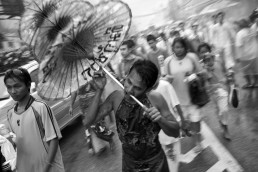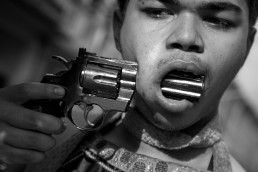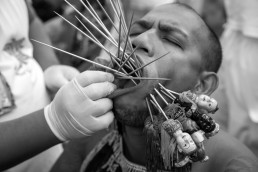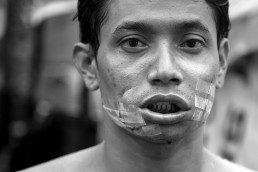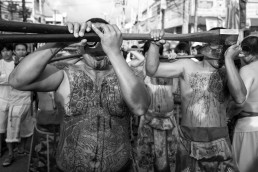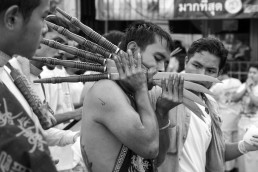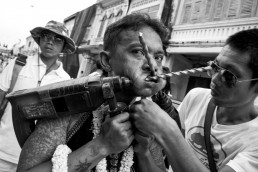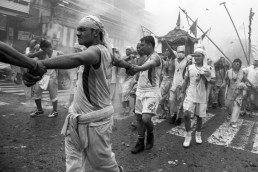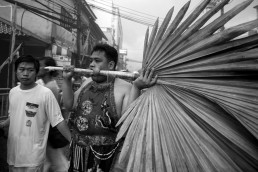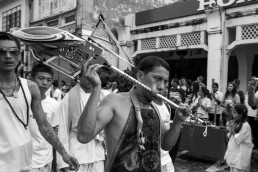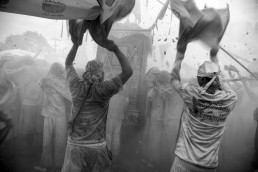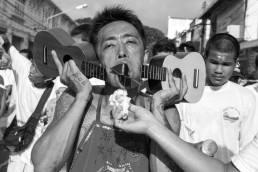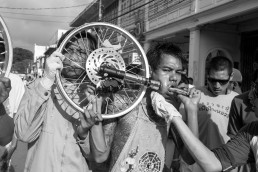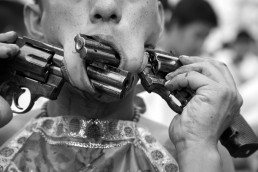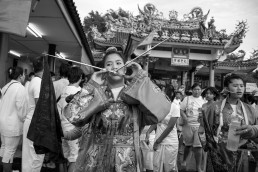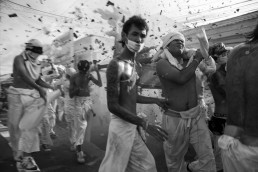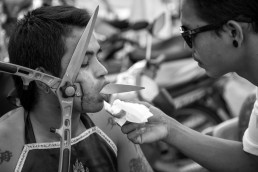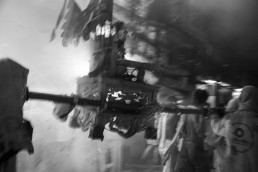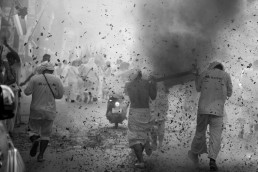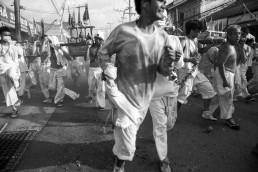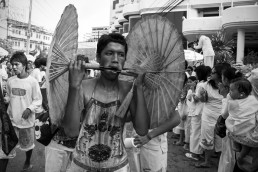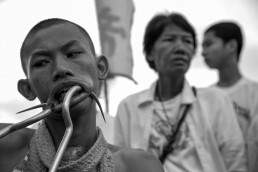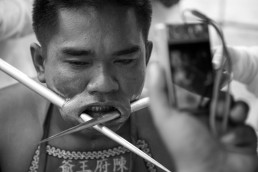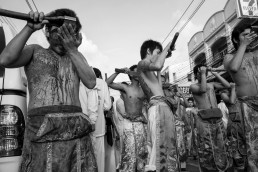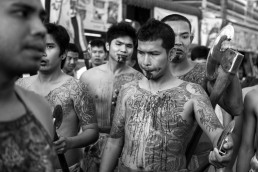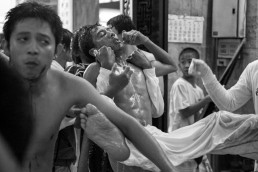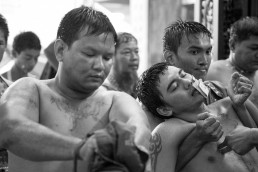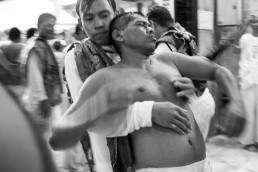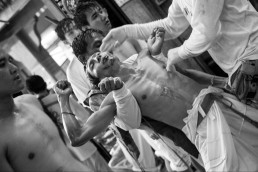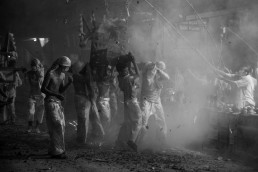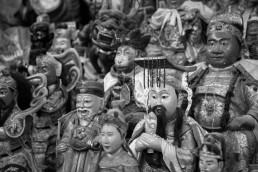Every year on the Thai island, hundreds of Chinese spirit mediums — known as 'horses of the gods' — perform extreme acts of self-mutilation, piercing their faces with swords, golf clubs, umbrellas, even handguns.
NESTLING OFF THAILAND’S west coast, the popular holiday island of Phuket has a permanent population of some 500,000 people, and its beaches, agreeable turquoise waters and welcoming hotels and villas pull in five million tourists a year.
Phuket is also home to more than 2,000 Chinese spirit mediums who, their believers believe, have a supernatural ability to connect with the great beyond.
Every year, to gain spiritual merit, they undergo ceremonial self-mutilation during Phuket’s annual Vegetarian Festival, which the world’s tabloid newspapers have variously called the “carnival of carnage”, a “bazaar of the bizarre” and the “gala of gore”.
THE VEGETARIAN FESTIVAL runs for nine days starting on the first day of the ninth month of the Chinese lunar calendar. This year it ran from September 27 through October 5, and on every one of those days Phuket’s spirit mediums, known locally as mah song, or “horses of the gods”, publicly slashed at themselves with swords and cutlasses and axes.
Some hacked at their tongues with serrated saws, blood dribbling down bare chests to leave great gobs of coagulating crimson gunk in the streets. And many more mah song underwent ritual piercing of their cheeks with skewers and knives.
And with golf clubs, badminton racquets and umbrellas; with handguns and with power drills; with motorcycle exhaust pipes and assorted automotive spare parts; with bunches of flowers, bunches of green bananas, with table legs and butcher’s hooks and musical instruments and with rows of glued-together dominos.
One gent thought it a good look to scar himself for life by puncturing his face with a radio-controlled model helicopter.
THE ORIGINS OF the festival are unclear. What is known is that Phuket was once a thriving centre for tin mining and many Chinese migrants worked there in the early 19th century (people of Chinese ancestry comprise a large proportion of Phuket’s population to this day). They lived in jungle conditions. Malaria and other tropical maladies were rife.
Sometime around 1825, a travelling opera troupe arrived from China to perform for the miners, but the musicians soon became sick with fever. Deeply superstitious, the troupe prayed to their gods and stuck to a vegetarian diet to honour them. When the sickness afflicting the troupe disappeared, the miners wondered how they had survived.
Ritual vegetarianism had been their saviour, the minstrels replied, and the festival has been held ever since, with Phuket’s Chinese community observing a 10-day vegetarian diet for purposes of spiritual cleansing.
HUMAN BUTCHERY WAS added much later, with mah song entering trances to be perforated on shrine grounds before joining lengthy processions through Phuket’s streets. Recent decades have seen mah song driven to ever greater extremes of mutilation, seemingly simply to stand out from the crowd.
Though the merit-making piercings should only make use of weapons mentioned in Chinese legends (swords and bladed staffs, for instance), it’s significantly easier to get your face in newspapers with the mischievous misuse of a ukulele, or a couple of ukuleles, or a bicycle pump, or an entire bicycle.
This year, one festival organiser called for Chinese shrines taking part — Phuket has about 40 shrines — to issue identity cards to mah song. Prasert Fakthongphol, president of Phuket Shrine Association, told the Phuket Gazette newspaper that this would “preserve the integrity of the spirit-medium community” and deter “fakes”. Such identity cards would feature each mah song’s name and photograph, and details of the god that possesses him or her.
Terrified at the thought of his coming suffering, the 27-year-old hacked the tongue out of a pig’s head … and wedged the cold organ into his mouth
Charlatans have, indeed, occasionally popped up in Phuket. In 2006, woodcarver Paitoon Khopwej was to join a procession. Terrified at the thought of his coming suffering, the 27-year-old hacked the tongue out of a pig’s head, skewered it with a sword and a saw blade, and wedged the cold organ into his mouth.
When his deception was discovered, Paitoon was beaten bloody by an angry mob, and elders at one shrine filed a complaint with police. The chastened woodcutter eventually served 15 days in Baan Bang Jo jail for “deceiving the public”.
THOUGH A BURLY, impressively tattooed fisherman stumbling through a torrential downpour with a ceremonial dagger or a significant chunk of a palm tree rammed through his filleted face makes for an arresting photograph, it is difficult to speak with the mah song during the festival. Not only are their vandalised mouths often spilling over with gore and saliva, but they are also clearly off with the fairies.
On day six of the festival this year, with one of its largest street processions just over, one young man shelters at a stall outside Phuket Town’s Jui Tui temple. The stall-holder punts polystyrene trays of mango and sticky rice for Bt30 (less than a dollar).
The young man is not interested in food, however. His lacerated and swollen face is held together with medical plasters, and he sucks gingerly on a Krong Thip cigarette (though officially, mah song are not permitted to smoke during the festival). He is not in the best of spirits.
Asked how it feels to wander across Phuket for three hours in a monsoon with a sword stuck through his face, he says he “cannot remember”. And how does the gloomy penitent feel now? “Tired,” he answers, dazed.
And with that, and without a goodbye, he stumbles away to be washed clean in the rain. ◉
Versions ran as a travel story in Post Magazine and as a photo essay in That’s Shanghai, way back in 2011. Download PDFs.
SHARE



